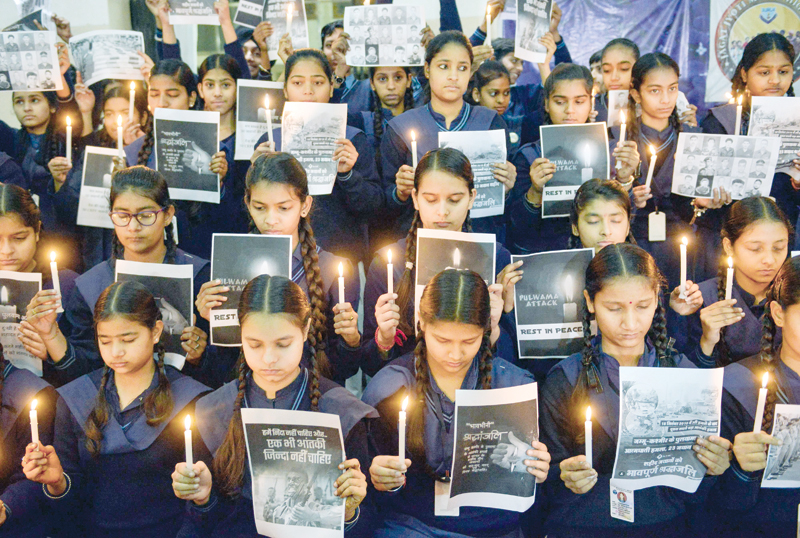

New Delhi: India and Pakistan’s troubled ties risked taking a dangerous new turn on Friday as New Delhi accused Islamabad of harbouring militants behind one of the deadliest attacks in three decades of bloodshed in Kashmir.
At least 41 paramilitary troops were killed on Thursday as explosives packed in a van ripped through a convoy bringing 2,500 troopers back from leave not far from the main city Srinagar, police said.
Local media reported that the Pakistan-based Jaish-e-Mohammed group claimed responsibility, with the vehicle driven by a known local militant, Aadil Ahmad alias Waqas Commando.
India’s foreign ministry said that Jaish-e-Mohammed head Masood Azhar “has been given full freedom by... Pakistan to operate and expand his terror infrastructure in territories under the control of Pakistan and to carry out attacks in India and elsewhere with impunity”.
“I want to tell the terrorist groups and their masters that they have committed a big mistake. They have to pay a heavy price,” Prime Minister Narendra Modi said on Friday after an emergency cabinet meeting.
“Security forces have been given a free hand to deal with terrorists,” Modi said, adding that the “blood of the people is boiling”.
Arun Jaitley, Finance Minister, promised to isolate Pakistan in the international community.
Islamabad, however, hit back at the suggestion it was involved.
“We strongly reject any insinuation by elements in the Indian media and government that seek to link the attack to Pakistan without investigations,” the Pakistan foreign ministry said.
The United States condemned the attack in “the strongest terms”, and called on “all countries... to deny safe haven and support for terrorists.’’ China urged “relevant regional countries” to work for peace.
Two buses of the Central Reserve Police Force (CRPF) in the 78-vehicle convoy on the Srinagar-Jammu highway bore the brunt of the blast, heard miles away.
“No one from the first bus survived,” a senior police official said on condition of anonymity, predicting the death toll could rise.
Blackened, mangled remains of at least one vehicle littered the highway. Reports said bodies and body parts were strewn around, making victims’ identification difficult.
Afterwards, hundreds of government forces cordoned off around 15 villages in the district the bomber came from and conducted house-to-house searches, a police officer and witnesses said.
Authorities suspended or slowed internet services across the Kashmir region as thousands of security men patrolled the streets.
Several parts of Jammu city were under curfew after protesters allegedly attacked properties. Protesters in many cities chanted slogans against Pakistan and burnt effigies of Azhar.
The shock attack surpasses one in 2016 that was the biggest in 14 years, claiming the lives of 19 soldiers in a brazen pre-dawn raid by militants on the Uri army camp.
India responded to that with the now-famous “surgical strikes” — an expression used in the title of a new Bollywood movie — across the heavily-militarised Line of Control, the de-facto border, several miles into Pakistan-administered Pakistan.
“The current situation has all the making of an India-Pakistan crisis,” said Moeed Yusuf from the US Institute of Peace. “The next 24-48 hours are crucial. This could get bad.”
“The hope was that India and Pakistan will get back to talking after the Indian elections later this year. I think the hawks on both sides are going to make it very difficult for that to happen now.”
On Friday India announced it was withdrawing its Most Favoured Nation Status — covering trade links — on Pakistan. India’s foreign ministry summoned Pakistan’s envoy to lodge a complaint. India also recalled its envoy from Islamabad for consultations, reports said.
But beyond these moves, Modi has “no easy options”, Manoj Joshi from the New Delhi based Observer Research Foundation think-tank said.
Military action could “escalate into something big”, he said.
“Diplomatic action against Pakistan is another option.” — AFP
Oman Observer is now on the WhatsApp channel. Click here



